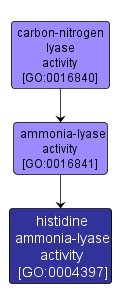GO TERM SUMMARY
|
| Name: |
histidine ammonia-lyase activity |
| Acc: |
GO:0004397 |
| Aspect: |
Molecular Function |
| Desc: |
Catalysis of the reaction: L-histidine = urocanate + NH3. |
Synonyms:
- histidase activity
- histidinase activity
- histidine alpha-deaminase activity
- L-histidine ammonia-lyase (urocanate-forming)
- L-histidine ammonia-lyase activity
|
|

|
INTERACTIVE GO GRAPH
|














